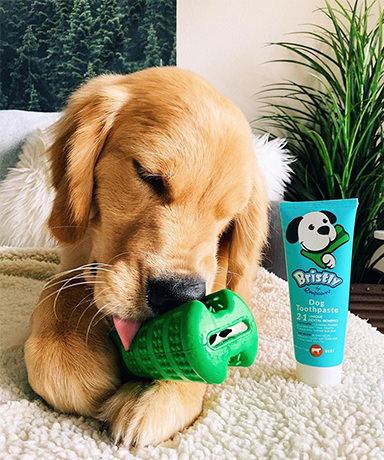Your Cart is Empty

Time to make your inbox pawsome
Sign up today and get 10% OFF your first purchase!


Plaque is a sticky substance that forms on your dog's teeth within a few hours of eating. In just 24 hours, plaque will start to harden after mixing with salts that exist in your dog's saliva. Without proper oral care, the plaque will mineralize and turn into tartar. Tartar is a porous-like film that is the perfect breeding ground for bacteria. When there is an accumulation of bacteria on your dog's teeth, it can migrate up into their gum-line leading to periodontal disease like gingivitis. Here are 5 ways plaque can form in your dog's mouth:
As mentioned above, when tartar builds up on your dog's teeth, they are more susceptible to bacteria growth, which can lead to gum disease and other oral problems. Not only are these afflictions caused by bacteria, but they create the ideal environment to foster bacteria as well, meaning it can easily multiply. While there is always a few hundred or so bacteria present in the environment of your pup's mouth, it is important to practice proper dog dental care in order to protect your pooch.
Let's face it: dogs will be dogs and will never stop exhibiting typical doggy behavior like licking themselves, licking humans, or eating things off the floor. While we as humans rely on our sense of vision and touch to navigate the world around us, dogs rely primarily on their sense of smell and taste, and anything that goes into their mouth can be riddled with bad bacteria that can lead to tartar and gum disease, like what has been mentioned, but that can also make them quite ill. Even if your dog isn't an expert hunter who can catch rabbits and mice in the backyard - which, who knows what kind of bacteria are lurking on those critters - every dog owner has probably experienced the horrific moment of their pooch trying to pick up a dead animal while on a walk. And if the thought of freshly caught animals in your dog's mouth doesn't paint the picture of dangerous bacteria to you, then roadkill might. In addition, while there is bacteria that organically occurs in dog's mouths, there is also natural bacteria that occurs on humans. If your dog licks your hand and happens to have a cut on his tongue or a sore in his mouth, the foreign bacteria from your skin can enter his bloodstream and make him very sick.
Although the debate between dry dog food and canned dog food still persists, wet food may be the second choice, as dry food generally does a better job of scraping the plaque off your dog's teeth. This does have its limitations, as even crunching on dry kibble doesn't do an effective job at cleaning the plaque that accumulates near the gum-line. Additionally, food can get stuck between your pup's teeth, accelerating the plaque formation process. No diet should be a replacement for your dog's dental care, and frequent brushing is always recommended.
A lack of cleanliness in your dog's food dish, water dish and toys can also lead to the formation of plaque. Just like you wouldn't eat off of a dirty plate, your dog shouldn't eat out of a dirty bowl, either. The fat in dog food, along with your dog's saliva, creates the ideal environment for bacteria to form in your pooch's bowl. If you neglect to clean your dog's water dish daily, a slimy substance called biofilm can form on the dish, and while this coating can contain good bacteria, it has the potential to conceal bacteria that can form tartar, as well. Dog toys can also harbor bacteria, yeast and even mold. Soft fabric or rope toys can easily turn into a host site for bacteria, mold, and other germs because the absorbent material traps drool and moisture.
Even if your dog never licked or ate what he wasn't supposed to, (they're dogs, that will never happen) they would still get plaque. This may be obvious at this point, but if you don't brush your dog's teeth, your dog has a much higher chance of developing periodontal disease due to the buildup of bacteria that permeates under the gums. While dental treats and bones do can knock off some of the plaque that forms on your pup's teeth, but his/her health will ultimately suffer without appropriate dog dental care.
Don’t worry! There is a solution.
